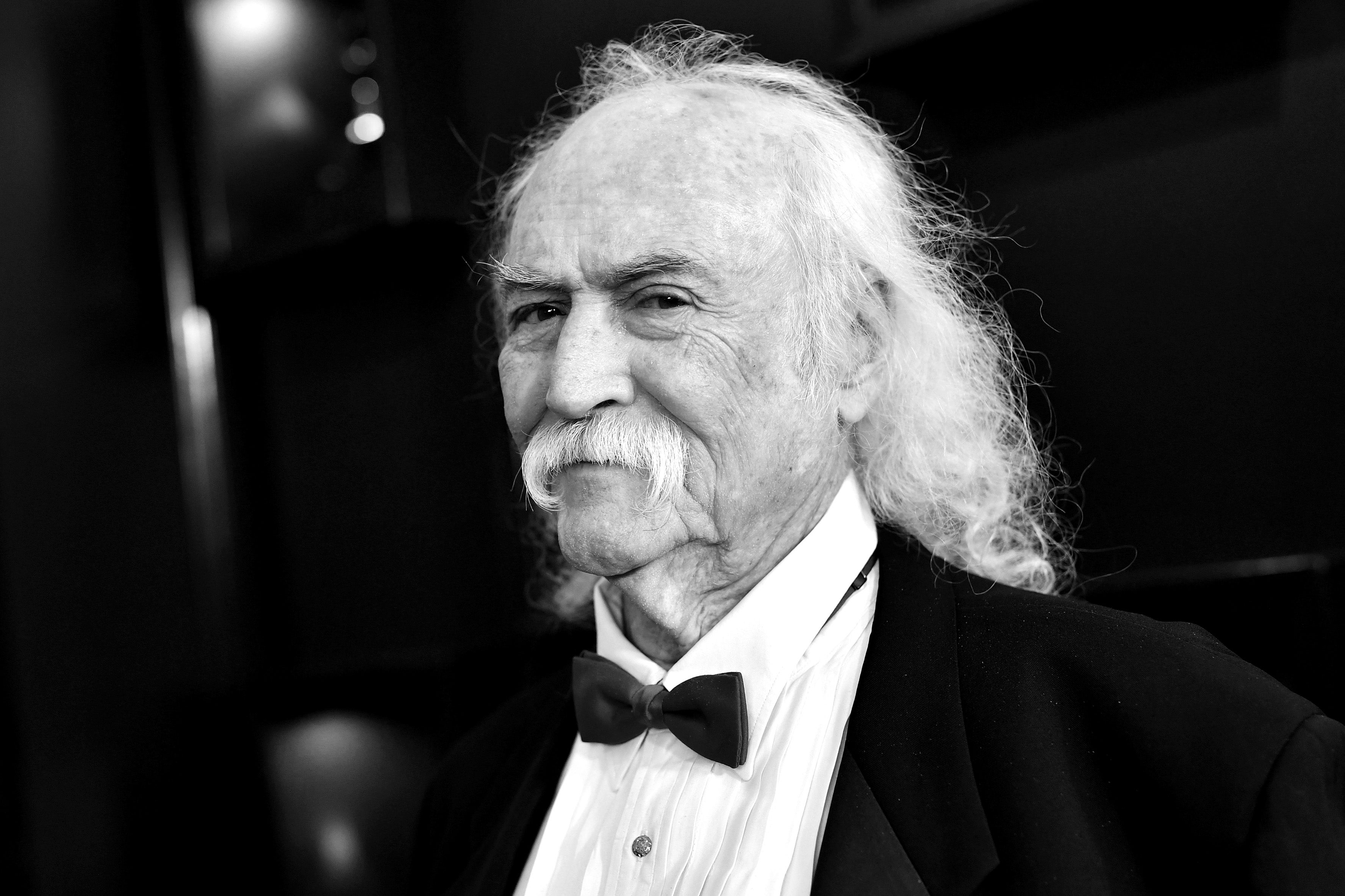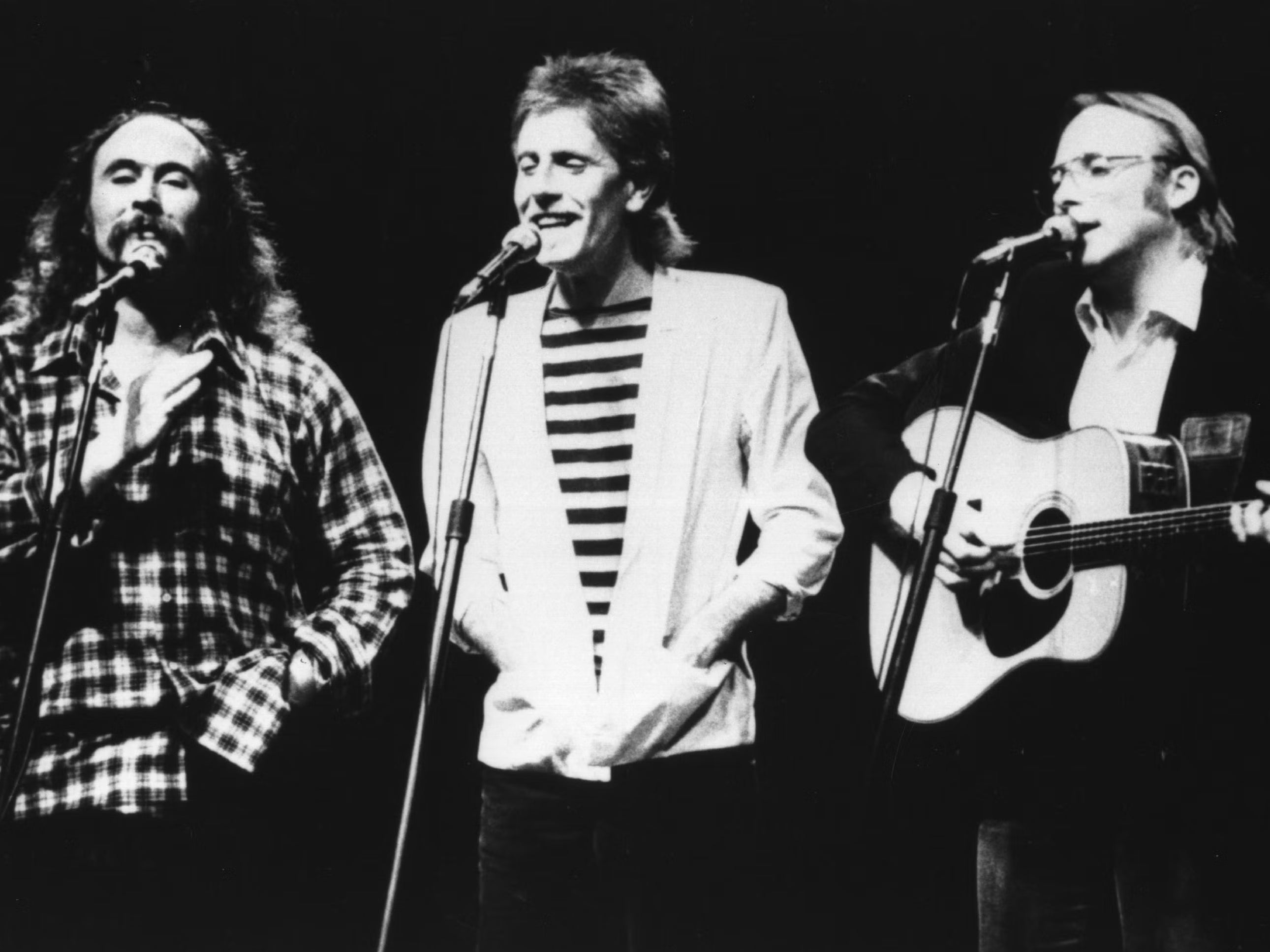David Crosby: The velvet-voiced hellraiser who became synonymous with the late-Sixties counterculture
The singer and guitarist of The Byrds and Crosby, Stills and Nash has died, aged 81, but his contribution to folk rock and the sound of the West Coast will live on. Mark Beaumont pays tribute

When The Byrds arrived in the UK for the first time in August 1965, they were hyped as the spearhead of an American Invasion. “The US Beatles!” headlines screamed as their lush cover of Bob Dylan’s “Mr Tambourine Man” topped the charts and their similarly titled debut album broke big on both sides of the pond.
Witnesses of their rammed half-hour show of multi-harmonied folk pop at London’s Flamingo Club were left unimpressed – “Flopsville!” declared Melody Maker – but in the end, the hype won out. Within two years The Byrds would stamp their mark on pop history, laying the foundations for folk rock with their renowned cover of Pete Seeger’s “Turn! Turn! Turn!” and their third album Fifth Dimension’s psychedelic mainstay “Eight Miles High”. And they contained at least one future musical icon in their midst. The writer of the vulnerable yet cynical “Everybody’s Been Burned”, master of crystalline guitar lines that hinted at jazz, and owner of a velvet voice that would become synonymous with late-Sixties counterculture. The one affectionately known as Croz.
College dropout, Greenwich Village alumnus, descendent of the prominent Van Cortlandt family and son of Oscar-winning cinematographer Floyd Crosby (and thereby one of the rock’n’roll era’s first nepo babies), David Crosby – who has died at the age of 81 – was of deceptive appearance. With his woollen hats, handlebar moustache and copious sideburn he could easily be mistaken, in later years, for a woodsman or trawler worker singing beautiful folk songs in an end-of-shift bar. However, in his swarthier youth with The Byrds and as part of the legendary Americana supergroup Crosby, Stills & Nash – and occasionally Young – he could match the attitude, drug intake, celebrity romances and brushes with law enforcement of any hair metal hellraiser.
His five-album stretch with The Byrds ended in 1967, according to his bandmates, because of Crosby’s supposed superiority complex (an impression that Croz put down to jealousy of his voice) and “insufferable” onstage political rants. Between songs at the Monterey Pop Festival, he spoke at length about the JFK assassination and how the world’s problems might be solved by giving all politicians LSD. In the wake of his departure, he discovered Joni Mitchell playing in a club in Florida, produced her debut album Song to a Seagull and became romantically involved – only to get very publicly dumped for cheating when Mitchell performed a song about it, “That Song About the Midway”, at a party at Peter Tork of The Monkees’ house.
Hooking up with Buffalo Springfield’s Stephen Stills and The Hollies’ Graham Nash to form Crosby, Stills & Nash in 1968 (the supergroup would later sporadically add Neil Young to the line-up), Crosby embarked on almost 50 years of tours and shifting collaboration among the four, during which the sublime folk rock harmony delivered onstage was counterbalanced by intense bickering, discord and ego clashes behind the scenes. By the end of his life Stills was the only member Crosby was still friendly with; Young, he told The Guardian in 2021, had “a genuine beef” over Crosby describing Young’s wife Daryl Hannah as a “predator”, while Nash had evolved over time into “my enemy”.
CSNY’s divisions weren’t helped by the addictions to freebase cocaine and heroin that Crosby developed following the death of his girlfriend Christine Hinton in a car accident in 1969. His drug issues would contribute to three heart attacks, a liver transplant and a nine-month spell in Texas state prison in 1986, having skipped bail two years earlier on charges of possessing cocaine and a .45-caliber handgun he carried following John Lennon’s assassination. “I expected to be dead when I was about 30,” he said in 2021, by that time 36 years clean of hard drugs.
For all of the rock survivor drama in Crosby’s life story, though, he was right to point out that “the important stuff in my life isn’t the troubles I’ve had, it’s the magic that’s happened to me to enable me to make all this music”. Though he only contributed one line to “Eight Miles High” and none of the biggest hit songs to CSNY (“Suite: Judy Blue Eyes”, “Ohio”, “Just a Song Before I Go”, “Wasted on the Way”), he was far more than just a pretty voice. “In My Dreams” and “Guinnevere”, Crosby’s tribute to Mitchell, Hinton and a third unnamed muse (believed to be Nancy Ross, the girlfriend Gram Parsons stole from Crosby at a party), are considered among CSNY’s most sublime folk pieces.
And several tracks that Crosby wrote or co-wrote cut to the heart of CSNY’s emotive, beatific activism. “Wooden Ships”, released in 1969 and inspired by Vietnam and the Cold War, took a gently psychedelic approach to a tale of the survivors of a nuclear apocalypse sailing away to restart civilisation. The Hendrix-like “Almost Cut My Hair” was his 1970 statement of counterculture rebellion, his luscious locks a “freak flag” flying in the face of an oppressive establishment. Speaking to The Independent in 2021 for one of his final interviews, he said, “It was a simple visual clue that we were different, and we liked that. I still like having my hair long, for two reasons. Because I think it looks better that way, but I also like it because it does say: ‘Hey, I’m a hippie, and I believe certain things.’ And yes, I do. I think love is better than war.”

Crosby was arguably the group’s most ardent political voice. On one of the group’s first primetime TV appearances on the Dick Cavett Show in 1969, it was Croz who garnered applause for calling for car and oil giants to be shut down to prevent pollution, and he remained forthright and outspoken on social and political issues throughout his life. To The Independent in 2021 for one of his final interviews, he railed against US interventionism in Iraq and Afghanistan, the corporate war machine and greed-driven climate change.
Enjoy unlimited access to 100 million ad-free songs and podcasts with Amazon Music
Sign up now for a 30-day free trial. Terms apply.
ADVERTISEMENT. If you sign up to this service we will earn commission. This revenue helps to fund journalism across The Independent.
Enjoy unlimited access to 100 million ad-free songs and podcasts with Amazon Music
Sign up now for a 30-day free trial. Terms apply.
ADVERTISEMENT. If you sign up to this service we will earn commission. This revenue helps to fund journalism across The Independent.
“I thought we would manage to get people to do the intelligent thing, the right thing,” he despaired, yet this came at the culmination of a happily productive final era of his life. After decades of sparse solo albums, Crosby released five in his final decade, all critically admired, and three produced by James Raymond, the musician son that Crosby only discovered he had in 1995, when Raymond was 31. “We became very, very close, and that’s a f***ing gift of gigantic proportions, man. It’s f***ing wonderful,” he said in that late interview. Fitting closure on an amazing journey; if any of us were to live half the life, create a fraction of the beauty and make a sliver of the change that Croz did, we could rest assured we’d relished our season.
Join our commenting forum
Join thought-provoking conversations, follow other Independent readers and see their replies
Comments


Bookmark popover
Removed from bookmarks